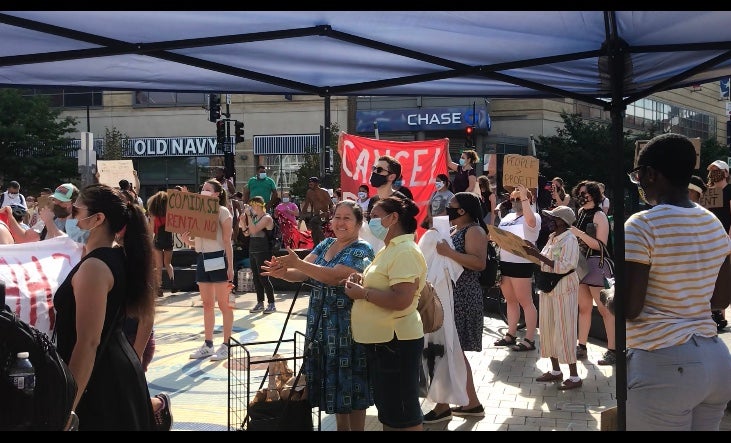Student Blog: Organizing with DCJWJ

Posted in News Organizing Internship
Rebuilding a campaign and keeping momentum going after being knocked down is a tricky thing to do–it requires patience, persistence, and a strong belief in what you’re fighting for. As a KI Intern, I worked with DC Jobs with Justice to do just this.
As an intern for their Reclaim Rent Control Campaign, my work centered around base building. The campaign worked with two City Council members to introduce a bill that expanded rent control but it didn’t go anywhere and the members that introduced it were removed from the housing committee, meaning the campaign had to start over. Every week, I called over 100 people who previously signed up on Reclaim Rent Control’s platform to ask them if they lived in rent controlled housing, wanted to volunteer with the campaign, or wanted to host a training for their organization or building.
The campaign’s platform has three main overarching goals. The first is to expand rent control and protect more tenants. The campaign fighting to include the thousands of 4-unit apartment buildings in the District as well as those built before 2005 under rent control. The campaign also wants to peg eligibility for rent control to a dynamic date so that new buildings are subject to rent control after 15 years. The last demand of this first goal is to allow only one rent increase a year for any DC rental housing that’s exempt from rent control, with advance notice.
The second goal is to close existing loopholes in the law. This would be done by eliminating Voluntary Agreements that take rents to market rate, implement stronger oversight of all landlord petitions at the Department of Housing and Community Development, make rent increases under Substantial Rehabilitation Petitions temporary rather than permanent, and clarify which upgrades qualify for a Capital Improvements Petition to avoid abuse of the process and define allowable costs, narrow the scope of Hardship Petitions, stagger allowable increases, and make increases temporary rather than permanent.
The final goal is to keep rent-controlled housing affordable. The campaign’s first demand is to cap annual rent increases at the level of inflation and eliminate the extra 2% for rent increases that’s allowed under current law. The second demand is to eliminate vacancy increases that incentivize landlords to turn over units at a faster rate.
The other half of the work consisted of hosting trainings with different groups and the wider community to introduce as many people as we could to our platform. This was the bulk of the base building process. I also went out to a few in person events, handing out flyers to people walking by and explaining what our mission was. On top of that, the other focus of rebuilding the campaign came in the form of policy work. I got to work with the steering committee of the campaign, and we met weekly to discuss next steps and the progress that was being made. My team gave updates on base building, and the other team gave updates on what changes they had made to the bill and who they were looking to work with to get it introduced. The interactions we had with tenants came to play a role in what changes got made to policy, and their stories were at the heart of what we are fighting for: the right to affordable housing.
Housing justice is an issue that’s come to mean a lot to me during my time at Georgetown. My freshman year I participated in an Alternative Spring Break Trip to Baltimore and there I learned about the history of redlining in the city and how the city and housing market were designed specifically to segregate Black and white communities.
In my hometown of Torrance, CA, homelessness is rising. During the pandemic, I worked with others in my community to provide supplies to the homeless, giving them masks, hand sanitizer, hats, sunscreen, and hot meals. Getting to hear their stories about the hardship of homelessness and learning from them what we could do to best serve furthered my interest in housing justice. Housing is a human right, everyone deserves to have a home to come back to at the end of the day, and affordability is just the tip of the iceberg to give people access to that right.
Catherine Shonack is a student in the College and was a 2021 Summer Organizing intern with DCJWJ
